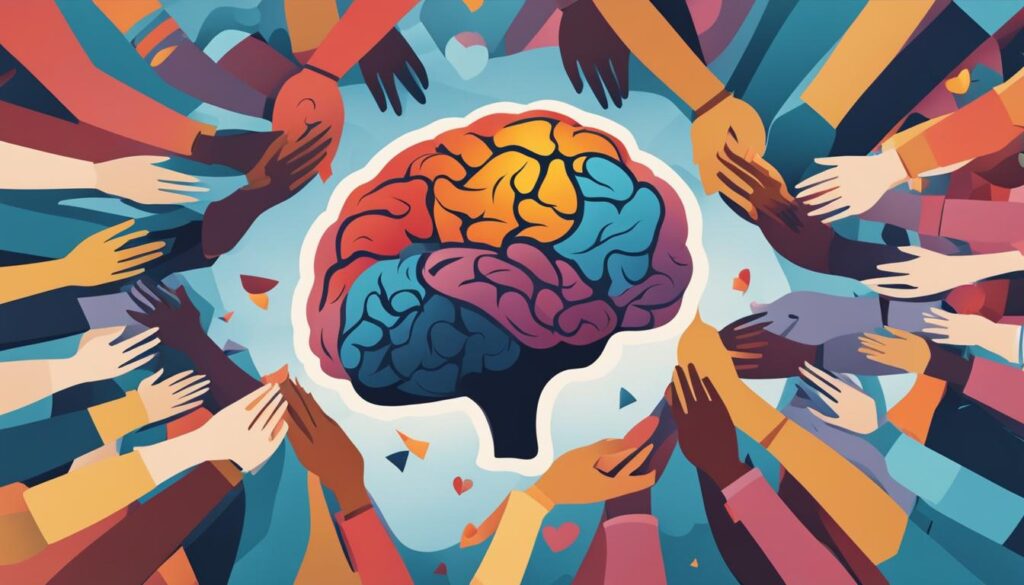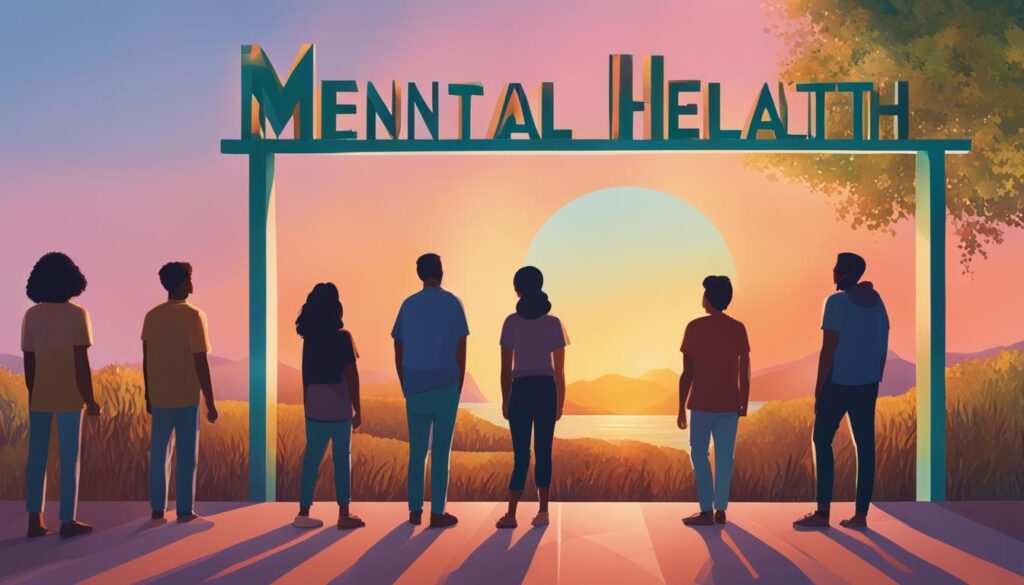As the leaves begin to turn and October ushers in cooler days, we also mark a time of crucial significance: Depression Awareness Month. It’s more than a date on the calendar; it’s an opportunity for each of us to pause and recognize the profound impact this mental illness has on millions. Depression touches lives indiscriminately, leaving a shadow in its wake, but during this month, we shine a light of hope and understanding.
In acknowledging October depression awareness, you join a collective effort to lift the veil on an often-misunderstood condition. This month is about breaking down barriers, opening dialogue, and educating ourselves and others. It’s about changing the narrative from one of isolation to one of solidarity and support. So, let’s come together to amplify the voices that strive towards a world where mental illness awareness is not just an annual event, but a cornerstone of our daily lives.
Understanding the Significance of Depression Awareness Month
With the annual observance of Depression Awareness Month, we are given a vital opportunity to address the silent struggles endured by countless individuals. This month serves as a reminder to not only educate ourselves about the signs and symptoms of depression but also to acknowledge the enduring stigma of mental health that discourages many from seeking help. By embracing this period of heightened focus, you contribute to reduced suffering, promote healing and foster inclusive communities sensitive to the complexities of mental health.

Recognizing Signs and Symptoms of Depression
Depression transcends mere feelings of sadness. It is a persistent, invasive disorder that impacts daily functioning and quality of life. To truly partake in mental health awareness, you should be able to identify these common signs:
- Persistent sadness or a sense of emptiness
- Marked loss of interest in previously enjoyed activities
- Significant changes in appetite or weight
- Difficulty sleeping or oversleeping
- Lack of energy, fatigue
- Feelings of worthlessness and undue guilt
- Difficulty thinking, focusing, or making decisions
- Recurrent thoughts of death or suicide
The above symptoms can manifest subtly and are frequently dismissed as transient feelings. However, they are often indicative of a deeper, underlying mental health issue.
Shedding Light on the Stigma of Mental Health
The stigma of mental health shamefully persists, casting a shadow over the true prevalence and impact of conditions like depression. It is a barrier that not only hampers individual recovery but also silences conversations on these topics. Depression Awareness Month confronts this stigma, championing the principle that mental health is just as critical as physical well-being. To highlight the prevalence and need for compassion, consider the following:
| Aspect | Impact of Stigma | How Awareness Helps |
|---|---|---|
| Educational Outreach | Limited understanding perpetuates myths and misconceptions. | Increases knowledge, dispels myths, and fosters empathy. |
| Community Support | Isolation due to fear of judgment or rejection. | Cultivates a supportive community environment. |
| Access to Resources | Stigma hinders individuals from seeking available help. | Encourages utilization of resources without shame. |
| Public Policy | Stigma leads to inadequate mental health policies. | Drives advocacy for more supportive mental health legislation. |
By leveraging the momentum generated by Depression Awareness Month, you can be part of a transformative movement that shifts societal attitudes toward recognizing depression signs and embracing proactive mental health awareness. Let’s stand united in this cause, promoting understanding and acceptance one conversation at a time.
Raising Awareness for Depression in Your Community
Each individual has the power to contribute to raising awareness for depression and fostering community involvement in mental health. By engaging in activities that highlight the importance of mental health, you become a vital part of the solution. Here are actionable steps to take in your circles that can lead to meaningful change.
Begin by planning and organizing events that focus on mental health education and support. Community events like health fairs, workshops, and seminars provide platforms for discussion and can spark collective action. Partner with local health professionals, nonprofits, and advocacy organizations to enhance the event’s impact.
- Host a seminar on recognizing depression signs and symptoms
- Invite speakers who are mental health professionals or those with lived experiences
- Coordinate with local libraries or community centers for event spaces
Apart from hosting events, community involvement in mental health should also involve outreach programs. You could volunteer with local support groups, contribute to mental health awareness campaigns, or start a fundraiser to help those in need access mental health services.
- Join local mental health support groups as a volunteer
- Help organize and promote awareness campaigns on social media
- Participate in charity runs or walks that support mental health causes
Every conversation about mental health, big or small, chips away at the stigma that shrouds depression.
Do not underestimate the power of conversations. Simply talking about mental health with your friends, family, and colleagues can ignite understanding and empathy. Share your knowledge about depression, directing those in need to appropriate resources and help.
- Initiate open discussions about mental health in your daily life
- Offer a listening ear to those who might be going through tough times
- Challenge misconceptions and misinformation about depression when encountered
To visually represent how these efforts can transform your community, let’s examine the potential impact through a detailed table:
| Activity | Purpose | Expected Outcome |
|---|---|---|
| Mental Health Workshops | Educational outreach on depression’s signs, symptoms, and resources | Better informed public, early identification, and intervention |
| Support Group Volunteering | Provide assistance and understanding for those impacted by depression | Increased support systems, reduction in personal isolation |
| Social Media Campaigns | Spread awareness and advocate for those suffering in silence | Greater reach and dismantling of stigma, especially among youth |
| Promotion of Mental Health Resources | Guide community members to professional help and support services | A more resilient community with access to necessary mental health care |
By taking these steps, you contribute significantly to raising awareness for depression and enhancing community involvement in mental health. Recruit family, friends, or colleagues and make this October a turning point for mental health awareness.

Highlighting the Importance of Mental Health Advocacy
In the journey toward a society where every individual’s mental health is treated with the same urgency and respect as physical health, mental health advocacy plays an indispensable role. During Depression Awareness Month, we delve into how advocates are essential in promoting mental wellness and what actions you can take to become a champion for mental health in your own community.
The Role of Advocates in Promoting Mental Wellness
Mental health advocates serve as the vanguards in the crusade against the misconceptions and prejudices that surround mental health disorders. Their steadfast commitment can be seen in how they positively influence policy, circulate crucial information, and lay the groundwork for a comprehensive support network. These actions substantially contribute to enhanced individual and public well-being.

To appreciate the profound impact of mental health advocacy, consider this: advocates are often at the forefront of securing funding for mental health services, thus amplifying the reach of life-saving resources. Moreover, they educate legislators and stakeholders, thereby influencing laws and policies that affect millions of lives.
- Advocates campaign for laws that protect the rights of those with mental illnesses.
- They disseminate up-to-date research and information that demystify mental health issues.
- Advocates also serve as a bridge connecting individuals to resources and support networks.
By becoming a mental health advocate, you lend your voice to the harmonious chorus calling for change – reminding every individual that they are not alone in their struggles.
You might now be contemplating how you can contribute to this significant cause. One of the most impactful steps is to educate yourself about mental health issues. When you are informed, you can effectively support those in need and dispel harmful stigmas within your circles.
| Activity | Objective | Impact on Mental Wellness |
|---|---|---|
| Education and Self-Awareness | To arm yourself with knowledge about mental health conditions and their treatment | Empowers you to provide accurate guidance and reduce misconceptions in your community. |
| Community Outreach | To share resources and information with a wider audience | Expands the support network and facilitates better access to mental health care for all. |
| Policy Advocacy | To influence the creation of fair and supportive mental health policies | Ensures that support systems are inclusive, governmental policies are empathetic, and workplaces are accommodating. |
Undoubtedly, your voice can echo loud and clear during this Depression Awareness Month, and indeed all year round, as you align with the vital mission of promoting mental wellness. As you consider evolving into a mental health advocate, remember that your efforts, be they big or small, pave the way toward a world that respects and nurtures mental well-being.
The Impact of Social Media in Fighting Against Depression
The advent of social media has undeniably transformed how we connect and communicate, particularly concerning mental health. Platforms like Facebook, Twitter, and Instagram have wielded a profound social media impact in the fight against depression, offering online mental health support that can reach people globally. Here, we delve into the roles and influences of social media in mental health advocacy and support.
Social media can be a double-edged sword when it comes to mental health. On the one hand, it provides invaluable spaces for individuals to share experiences, find community support, and access information. On the other hand, the use of social networks can sometimes exacerbate feelings of inadequacy or present misinformation about mental health.
Let’s explore some of the positive aspects of this tool:
- Many mental health organizations utilize platforms to spread awareness about depression, reducing stigma and sharing factual information.
- Social media forums can offer a sense of belonging, connecting those who might feel isolated due to their depression with others who understand their struggles.
- Success stories and positive affirmations circulate, providing hope and motivation for those in need of uplifting content.
However, navigating the world of social media requires careful consideration of its potential downsides:
- Negative comparisons to the seemingly ‘perfect’ lives of others on social media can lead to lowered self-esteem and deeper feelings of depression.
- The risk of encountering misinformation which could lead to harmful self-diagnosis or inappropriate treatment options.
- Privacy concerns with sharing personal mental health stories in a public or semi-public forum.
While social media can serve as a beacon of hope and connection, it’s important to be critical of the information we consume and share, always striving to foster positive and healthy online communities.
To give you a clearer picture of the specific impact social media has had on mental health advocacy and support, let’s examine a comparative table:
| Platform | Positive Impact | Potential Downside |
|---|---|---|
| Groups dedicated to mental health support, real-time chat for instant connection | Algorithm-driven content may reduce exposure to helpful support groups | |
| Hashtags like #MentalHealthAwareness become movements, reaching wide audiences quickly | Character limit may oversimplify complex mental health discussions | |
| Visual storytelling through posts can humanize and destigmatize depression | Overemphasis on aesthetics may create unrealistic expectations for personal wellbeing |
As digital denizens of the 21st century, understanding and utilizing the social media impact for the greater good in the fight against depression is within our grasp. By fostering online communities and extending online mental health support, social media holds the power to enact real change — bridging the gap between silence and open dialogue.

Resources and Support for Individuals Struggling with Depression
When grappling with depression, knowing where to find depression support resources can be a beacon of light in a challenging time. Understanding the wealth of help for depression and how to access mental health resources can make a significant difference. Below, you’ll find a compilation of various avenues of support, ensuring that you or your loved ones can navigate towards recovery and well-being.
Depression can feel isolating, but support is closer than you think—reaching out is the first step.
Availing the right kind of support hinges on your specific needs, here we offer a comprehensive outline:
- National helplines like the National Suicide Prevention Lifeline (1-800-273-TALK) provide immediate support for crisis situations.
- Professional counseling options, including in-person therapy, online platforms like BetterHelp or Talkspace, offer flexibility and privacy.
- Local and online support groups create a community of shared experiences—platforms such as NAMI facilitate both types.
- Mobile health applications, such as Calm or Moodfit, provide tools for self-management and symptom tracking.
To aid in understanding what suits your circumstances best, here is a detailed table:
| Resource | Type of Support | How to Access |
|---|---|---|
| Helplines | Immediate crisis intervention | Phone call, text messaging |
| Professional Counseling | Personalized therapeutic support | Book appointments online or via phone |
| Support Groups | Peer sharing and community | Search online databases or community centers |
| Mobile Apps | Self-help and daily maintenance | Download from App Store or Google Play |
If you encounter someone in need, don’t hesitate to share these depression support resources. Empowering others by guiding them toward help for depression reinforces community solidarity and furthers the reach of vital mental health resources.
Remember, these resources are designed to supplement, not replace, professional medical advice. Always consult with a healthcare provider for personalized care.

Conclusion
As we reflect on the insights shared throughout Depression Awareness Month, we recognize the essential role each one of us plays in promoting mental health awareness. By understanding the multifaceted nature of depression and shedding light on the nuanced challenges it presents, we initiate conversations that can transform perspectives and societal norms. This month serves as a call to action for you, urging engagement and participation within your personal and wider mental health community support networks.
Embrace the change you can make by sharing knowledge, offering support to those around you, and investing time in self-education. Your involvement contributes to a collective effort that works inexorably towards altering the landscape of mental health awareness, to one that is inclusive, empathetic, and proactive. Keep in mind that your voice has power—use it to advocate for those who may struggle in silence, fostering a community ethos that is strong and supportive.
Let’s carry the momentum of this month forward, beyond just October. This is an ongoing commitment to not only observe but to actively partake in promoting mental health awareness and to cultivate resilience within each other. As you move through the days ahead, consider the steps you can take to energize this vital cause, making a lasting difference in your community and beyond. Remember, each small action you take weaves into the broader fabric of Depression awareness month and its resonating impact.
FAQ
Q: What is Depression Awareness Month and why is it important?
A: Depression Awareness Month is observed annually in October and is a time dedicated to raising awareness about depression, a mental illness that can affect anyone, regardless of age, race, gender, or socioeconomic status. Its significance lies in educating the public, reducing stigma, and encouraging those affected to seek help. It’s a month to focus on understanding, preventing, and treating depression while promoting mental wellness and support for those who struggle with this condition.
Q: What can I do to observe Depression Awareness Month?
A: You can observe Depression Awareness Month by participating in local events aimed at raising awareness, educating yourself and others about the signs and symptoms of depression, advocating for those affected, and promoting discussions around mental health. Sharing information on social media, volunteering with mental health organizations, or simply wearing a ribbon for awareness can all contribute to the cause.
Q: What are the common signs and symptoms of depression?
A: The common signs and symptoms of depression include persistent feelings of sadness, hopelessness, or emptiness, loss of interest in activities once enjoyed, changes in appetite or weight, sleep disturbances, fatigue, difficulty concentrating, irritability, physical symptoms like aches and pains, and thoughts of death or suicide. If you or someone you know is showing these signs, reaching out for professional help is an important step.
Q: Why is it important to address the stigma surrounding mental health?
A: Addressing the stigma surrounding mental health is crucial because it can prevent people from seeking the help they need. Stigma leads to discrimination, misunderstanding, and social exclusion, which can worsen the symptoms of depression and make recovery more difficult. By being open about mental health and creating a supportive environment, we can encourage individuals to seek help without fear of judgment.
Q: How can I help raise awareness for depression in my community?
A: You can help raise awareness for depression in your community by organizing or participating in awareness events, campaigns, or workshops. Sharing information and resources, starting conversations about mental health, and being a compassionate listener for those around you are also effective ways to make a difference at a local level. Furthermore, advocating for policy changes and improved support systems can have a lasting impact on your community’s mental health landscape.
Q: What role do mental health advocates play in promoting mental wellness?
A: Mental health advocates play a significant role in promoting mental wellness by raising public awareness, influencing policy and legislation, providing support and education, and fighting against stigma. They work tirelessly to ensure that those affected by mental health issues have access to the resources and support they need while fostering a culture of openness and understanding around mental health.
Q: How does social media impact the fight against depression?
A: Social media can have a significant impact on the fight against depression by facilitating the spread of awareness, allowing for the sharing of personal stories, and providing support through various online communities. However, it’s important to be wary of the downsides, such as exposure to misinformation or online negativity, which may exacerbate feelings of depression for some users. Using social media responsibly can enhance its benefits in supporting mental health.
Q: Where can I find resources and support if I’m struggling with depression?
A: If you’re struggling with depression, there are many resources available, including hotlines, such as the National Suicide Prevention Lifeline, professional counseling services, support groups both in-person and online, and mobile apps designed for mental health. Accessing these resources can be as simple as doing an internet search, calling a hotline, or asking for referrals from a healthcare provider. Sharing these options with others can also help them find the support they need.


